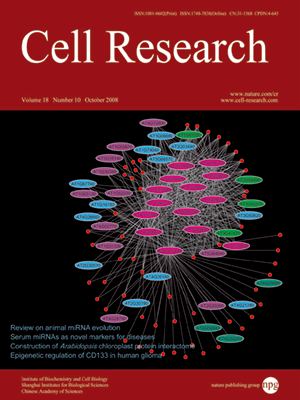
Volume 18, No 10, Oct 2008
ISSN: 1001-0602
EISSN: 1748-7838 2018
impact factor 17.848*
(Clarivate Analytics, 2019)
Volume 18 Issue 10, October 2008: 1061-1073
ORIGINAL ARTICLES
Differential effects of p63 mutants on transactivation of p53 and/or p63 responsive genes
Shama K Khokhar1,*, Ramakrishna Kommagani1,* and Madhavi P Kadakia1,2
1Department of Biochemistry and Molecular Biology, Boonshoft School of Medicine, Wright State University, 122 Diggs Bldg, 3640 Colonel Glenn Highway, Dayton, OH 45435, USA;
2Center for Genomics Research, Boonshoft School of Medicine, Wright State University, 3640 Col Glenn Highway, Dayton, OH 45435, USA
Correspondence: Madhavi Kadakia(madhavi.kadakia@wright.edu)
p63, known to play a role in development, has more recently also been implicated in cancer progression. Mutations in p63 have been shown to be responsible for several human developmental diseases. Differential splicing of the p63 gene gives rise to p63 isoforms, which can act either as tumor suppressors or as oncogene. In this report, we studied the effects of naturally occurring TAp63γ mutants on the regulation of p53/p63 and p63 specific target genes. We observed significant differences among p63 mutants to regulate the p53/p63 and p63 specific target genes. Additionally, we observed a differential effect of p63 mutants on wildtype-p63-mediated induction of p53/p63 and p63 specific target genes. We also demonstrated that these mutants differentially regulate the binding of wildtype p63 to the promoter of target genes. Furthermore, the effects of these mutants on cell death and survival were consistent with their ability to regulate the downstream targets when compared to wildtype TAp63. In summary, our data demonstrate that p63 mutants exhibit differential effects on p63 and p53/p63 specific target genes and on the induction of apoptosis, and provide further insight into the function of p63.
Cell Research (2008) 18:1061-1073. doi: 10.1038/cr.2008.82; published online 15 July 2008
FULL TEXT | PDF
Browse 1926


